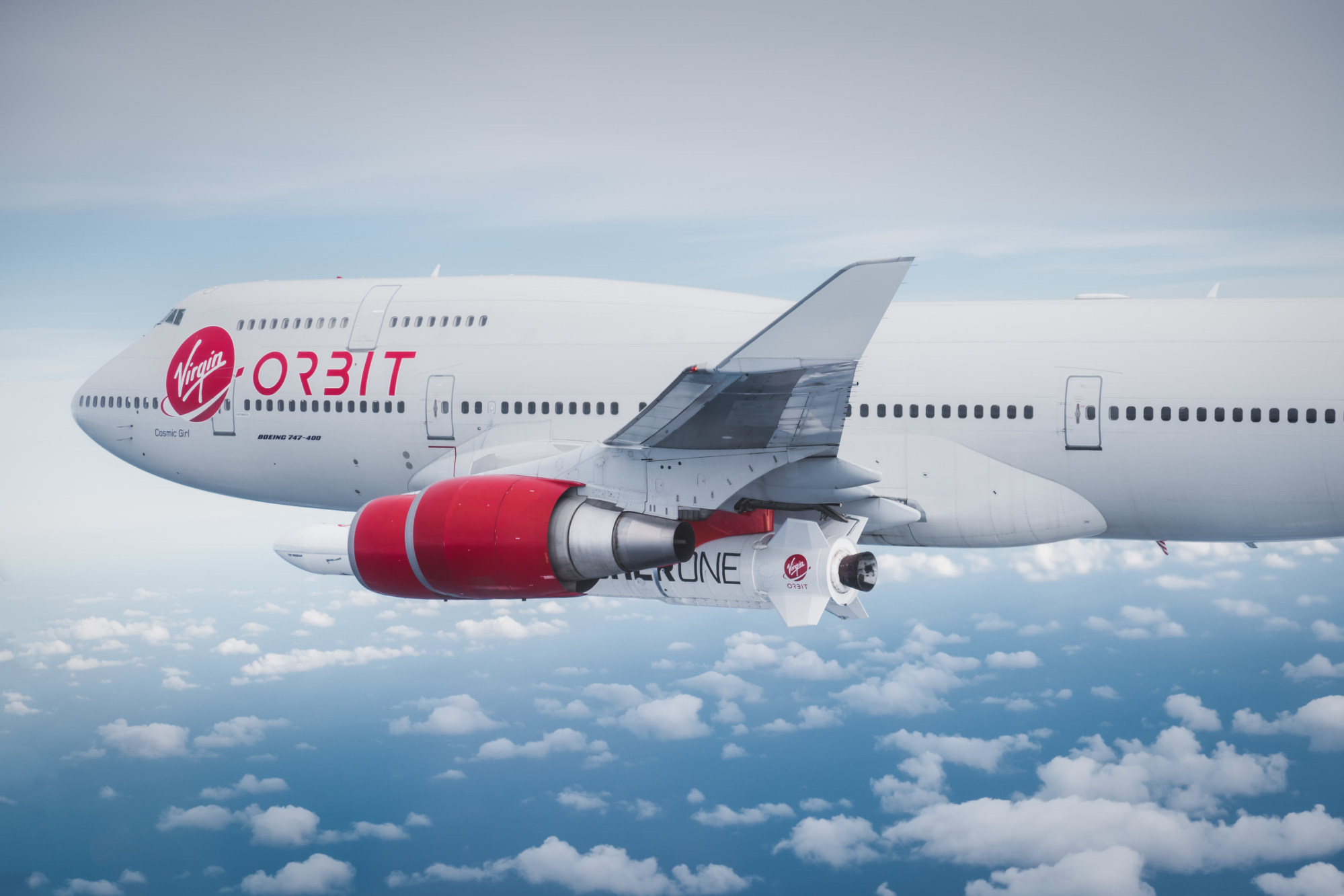
UK surfing town channels Cape Canaveral with nation’s first space launch from home soil
- Virgin Orbit, part-owned by billionaire Richard Branson, plans to use a modified Boeing 747 with a rocket attached under its wing for a ‘horizontal’ launch
- The mission has been given a window for take-off on Monday night in Newquay, Cornwall; fewer than 10 nations currently send satellites into orbit from home turf
The small group of nations to have sent rockets into the sky from their own soil is about to gain a new member as Britain makes its first-ever launch from a seaside town better known for surfing and sandy beaches than space adventures.
The mission will take off from Spaceport Cornwall in Newquay, southwest England, the first of a clutch of bases through which the UK aims to establish itself as a major player in the sector amid surging demand for launch capacity.
The flight involves a so-called horizontal launch, with a rocket deployed from under the wing of a modified Boeing 747 plane departing from Newquay’s former air force runway.
Virgin Orbit, part-owned by billionaire Richard Branson, who founded the Virgin Atlantic airline, plans to use the altered plane for the first time outside the company’s base in the United States.
Once it is at around 35,000 feet, the rocket will be released over the Atlantic, taking small satellites from seven customers into orbit in what is known as a horizontal launch.
The mission has been given a window for take-off from 2216 local time on Monday but that is dependent on the weather plus other scheduling and system issues, and Virgin Orbit said there are backup dates in mid and late January.
Two Scottish bases are meanwhile committed to Cape Canaveral-style vertical blast-offs by the end of the year, while three other UK sites are seeking the go-ahead for horizontal launches.

Branson said Monday’s scheduled launch represents a breakthrough for the space programme in Europe and the UK in particular.
“It’s a milestone,” the billionaire said. “You’ve never before had a launch from Europe. And it’s nice that the UK will be the first place in Europe to put rockets and satellites into space. I’m very supportive of that.”
Melissa Thorpe, head of Spaceport Cornwall, said the Virgin Orbit launch will mark a “phenomenal moment” for a project that began life as a bid to bolster business at Newquay airport after the Royal Air Force ended flights from its runway 15 years ago, and which remains owned by the local council.
Britain’s push into spaceports comes half a century after it abandoned a push to establish an independent launch capability. Fewer than 10 nations currently send satellites into orbit from their home soil, and there are no such sites in western Europe, with the European Space Agency using the Guiana Space Centre in South America for its missions.

A successful ground test known as a “wet dress rehearsal”, which involves fuelling the rocket inside a special safety zone, was held on Thursday, officials involved in the launch said.
The idea of releasing a rocket from a converted aircraft, pioneered by Orbital Sciences in the 1990s, is designed to offer a flexible and low-cost route to orbit as the number of small satellites in low Earth orbit grows dramatically.
The mission highlights an emerging small-launch sector just as Europe faces a growing crisis due to the Ukraine war, cutting access to Russian Soyuz vehicles, as well as Ariane 6 delays and the grounding of Vega rockets after a failed launch last month.
Britain has a large space industry employing 47,000 people, who build more satellites than anywhere outside the United States, but those have had to travel to spaceports in the United States, French Guiana or Kazakhstan before they can make it into orbit.
With two vertical micro-launch sites planned in Scotland, Britain now faces competition from Scandinavia and Germany in a new market for small launchers carrying miniature payloads to low Earth orbit, but believes it has an advantage due to its proximity to less congested oceanic airspace.
Even so, the launch was delayed in part due to the myriad regulatory clearances needed on the inaugural flight.
“When you look at the way that the low Earth orbit economy is developing, it’s the place that everybody is looking to put their satellites, whether it be for climate change, observation or urban development, or indeed for security purposes,” said Ian Annett, deputy CEO of the UK Space Agency.
“The ability to access low Earth orbit with micro-launches is definitely not a static market – it is one that is continuing to grow,” he said.
The European Space Agency recently embraced the use of small launchers for some missions, though commentators such as Peter de Selding, co-founder of SpaceIntelReport.com, have questioned whether there is enough demand in Europe for multiple types.
The rural Cornwall spaceport is located at a regional passenger airport in Newquay, which won approval late last year.
The mission has been dubbed “Start Me Up”, after a Rolling Stones song released on Virgin’s sister record label, and is a joint project with the UK Space Agency, Cornwall Council and Britain’s Royal Air Force.
The rocket and other parts and supporting equipment were flown to the UK to be assembled there.
“Basically, within a couple of weeks, a blank slab of cement was a space launch operations centre,” Virgin Orbit CEO Dan Hart said.
Now, Virgin Orbit hopes the launch will demonstrate the global reach of its 747-based system beyond traditional launch pads. It says it is in discussions to apply the same blueprint in Australia, Japan and elsewhere.
“This activity opens up a gateway for space launch in the UK, but it also opens up an idea that space launch does not have to be centralised in a couple of places in the world,” Hart said.
Analysts say that could stimulate national security demand and carve out a flexible launch network to fill gaps quickly in times of conflict: a need highlighted by the Ukraine war.
But de Selding warned controlling costs in the already economically stressed space launch sector would be crucial.
Additional reporting by Bloomberg

